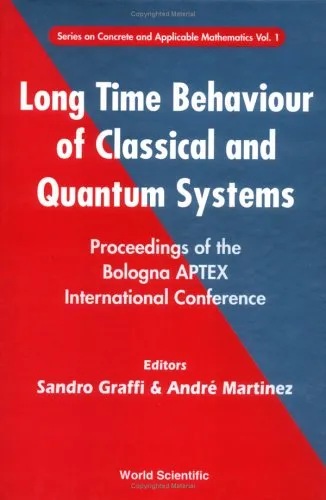Long Time Behaviour of Classical and Quantum Systems: Proceedings of the Bologna Aptex International Conference, Bologna, Italy 13-17 September 1999 (Series on Concrete and Applicable Mathematics 1)
4.5
Reviews from our users

You Can Ask your questions from this book's AI after Login
Each download or ask from book AI costs 2 points. To earn more free points, please visit the Points Guide Page and complete some valuable actions.Introduction to "Long Time Behaviour of Classical and Quantum Systems"
Welcome to an insightful journey into the rigorous mathematical exploration of classical and quantum systems, as presented in "Long Time Behaviour of Classical and Quantum Systems: Proceedings of the Bologna Aptex International Conference, Bologna, Italy 13-17 September 1999." This book is an essential contribution to the domain of mathematical physics, offering advanced perspectives on the intricate dynamics of systems over extended time periods. Derived from the proceedings of the prestigious Bologna Aptex International Conference, it brings together some of the finest minds in mathematics and physics, consolidating their research and findings in one comprehensive publication.
Detailed Summary of the Book
At its core, this book serves as a collection of research papers and studies presented at the Bologna Aptex International Conference. It focuses on the mathematical modeling and analysis of classical and quantum systems, particularly their behavior over long timescales. Researchers from diverse backgrounds delve into both theoretical and applied aspects of dynamics, tackling questions such as stability, chaos, integrability, and decay rates in various physical systems.
The book begins by setting the stage with fundamental principles of classical mechanics and quantum theory, providing a shared foundation for the more specialized topics that follow. Key sections explore the long-term evolution of Hamiltonian systems and ergodic behavior, underlining their significance in understanding equilibrium states in statistical mechanics. Similarly, quantum systems receive thorough treatment, with discussions on spectral properties, semiclassical limits, and the interplay between operator theory and wave propagation. The multi-disciplinary nature of the research makes the book an invaluable resource for mathematicians, physicists, and engineers alike.
In addition to tackling theoretical constructs, the book incorporates real-world applications. Topics such as quantum scattering theory, asymptotic analysis of partial differential equations, and nonlinear dynamics underscore the relevance of the long-time behavior of systems in both academic and practical contexts. This synergy between theory and practice manifests in novel mathematical techniques designed to address pressing questions in quantum technology, classical mechanics, and even cosmology.
Key Takeaways
- Enhanced understanding of the mathematical principles governing classical and quantum systems.
- Insights into the long-term stability and decay properties of integrable and non-integrable systems alike.
- Introduction to modern approaches for analyzing scattering problems and spectral theory in quantum mechanics.
- Contributions from leading experts that span disciplines, offering solutions to problems at the intersection of mathematics and physics.
- Detailed expositions of numerical and analytical techniques for tackling real-world challenges across various fields.
Famous Quotes from the Book
"Mathematics is the natural language of physics, and through this unification, we seek to unravel the mysteries of long-term dynamics in systems both classical and quantum."
"The subtle interplay between chaos and order is perhaps one of the most fascinating aspects of long-term system behavior, challenging both our analytical and computational approaches."
Why This Book Matters
In the vast landscape of research literature on mathematical physics, "Long Time Behaviour of Classical and Quantum Systems" holds a special place. It bridges decades of theoretical insights with modern methodologies, providing readers with a well-rounded perspective on the intricate questions posed by dynamic systems. The blending of classical and quantum themes allows for a holistic understanding that is highly beneficial to both students and seasoned researchers.
This book is particularly timely, given the growing interest in quantum computation, nanotechnology, and advanced simulation techniques. By addressing the mathematical foundations of these topics, it equips readers with the knowledge required to lead pioneering efforts in these rapidly advancing fields. Moreover, the international collaboration showcased within these proceedings reflects the collective pursuit of knowledge that characterizes the scientific community.
Free Direct Download
Get Free Access to Download this and other Thousands of Books (Join Now)
For read this book you need PDF Reader Software like Foxit Reader


